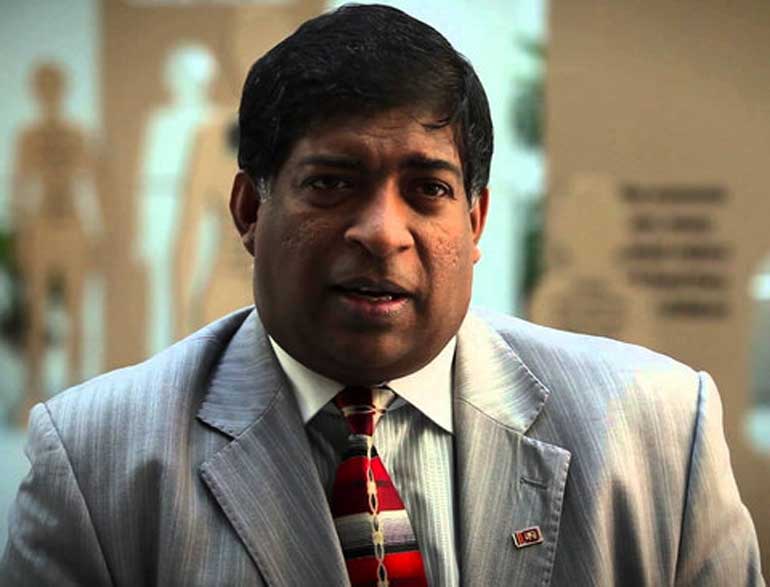Wednesday Feb 18, 2026
Wednesday Feb 18, 2026
Monday, 14 September 2015 00:05 - - {{hitsCtrl.values.hits}}
 Finance Minister Ravi Karunanayake
Finance Minister Ravi Karunanayake
By Charumini de Silva
The Essential Food Commodities Association will meet Finance Minister Ravi Karunanayake this week to discuss the issues that might arise in the future as a result of the recent tax hike that was imposed on sugar imports.
The Government last week imposed a special commodity levy of Rs. 12 per kilo with a ruling that the hike could not be passed on to consumers.
Essential Food Commodities Association Chairman Nihal Seneviratne told the Daily FT that the association had already contacted the Consumer Affairs Authority (CAA) to do away with the control price on sugar, as it was unreasonable for the importers.
Clarifying his point further, he said that in an open market economy which was highly dependent on an import-based market it was very unreasonable to have controlled prices on commodities like sugar.
Seneviratne said that although the CAA said that they would consider their suggestion of lifting the control price over sugar, eventually they would also adhere to the direction given by the Finance Ministry.
Lamenting over the difficulties the sugar importers face currently, he said that they only enjoyed a very thin margin of 1% to 1.5% compared to other commodities that are enjoying huge margins from both retail and wholesale.
“Products like milk powder are enjoying huge margins and they get to play around with their margins. We are doing bulk imports and our margins are quite thin compared to them. Thus, it is not fair for the authorities to whack us with tax hikes and enforce a control price in the local market,” he added.
However, Seneviratne said that there was no short supply of sugar imports to the country and assured that there were enough stocks of sugar which were imported at the price before the tax hike.
Commenting on new stock arrivals under the revised prices, he claimed that there would certainly be an increase in the local market price of sugar.
This is despite according to Central Bank, the CIF price of a ton of white sugar in international markets was $ 401 in June down by $ 109 or 21% over a year earlier. In rupee terms it was down by 19% to Rs. 53,713.
Nevertheless Seneviratne noted it would be very difficult for the sugar importers to keep up with the current prices with new stocks of sugar coming in at increased prices. “We are compelled to consider it in our pricing and will be definitely felt by the consumers outside the Western Province as additional cost of transportation coming in,” he said.
Noting that they could not rely on the external challenges, like the unstable exchange rate, he said it was important that the Government take a closer look at the issue and do away with the control price of sugar in the local market.
“The rupee depreciated over 3% during the past couple of days and if the dollar shoots up to the Rs.145 level it would be impossible to control anything, as all imported commodities will skyrocket with immediate effect,” he said.
He said that Sri Lanka mainly imported sugar from India and Brazil. “Although Brazil is the number one sugar manufacturer in the world, the majority of our imports are brought in from India as it is less risky. Importing sugar from Brazil incorporates a huge risk and is time consuming, therefore many importers now tend to import from India.”
He went on to state that the Government imposed the tax hike when India too increased its sugar prices, putting them in a real dilemma.
“The sugar import business is also like gambling in the stock market, very uncertain. One day you make money and the next day you incur heavy losses. Hence, we hope that the discussion we wish to have with the Minister will be beneficial to the industry,” Seneviratne said.
An importer who wished to remain anonymous told the Daily FT that they were compelled to increase the sugar prices in Colombo in the near future as they could not take on the tax burden themselves.
“Already the retail price has increased between Rs. 95 to Rs. 100 a kilo of imported sugar while the wholesale price has increased to Rs. 83 despite the Government ruling of the control price,” he added.
The Finance Ministry on Wednesday (9) said there would be no change in the prices for consumers and current levels of Rs. 95 per kilo of sugar in packet form and Rs. 88 per kilo for those sold in loose would be maintained. The Consumer Affairs Authority (CAA) has been directed to ensure maintenance of the specified retail price in the market.
Elaborating further, he said that it was difficult to maintain the prices at this level with new stocks being imported and it would definitely be added on to the consumers eventually.
He anticipates that the transport cost of sugar will also be increased at least between Rs. 2 to Rs. 3 in the near future.
“Currently, we do not enjoy any profit margins at all. We are selling imported sugar even below the cost that we are importing them and the dollar is shooting up at a high rate of knots which makes it difficult for us to do business with the Government having control prices,” he noted.
He suggested that the Government should carefully consider this issue and find a viable solution for it before it was too late.
Due to lower prices and volume, import expenditure on sugar declined by 54.7% to $ 18 million in June.
In the first half sugar and confectionery imports amounted to $ 140 million, down marginally by only 1.7% over the corresponding period of last year.